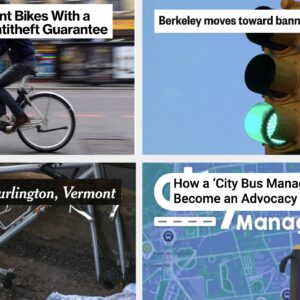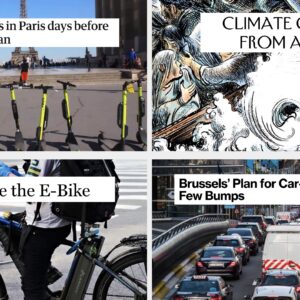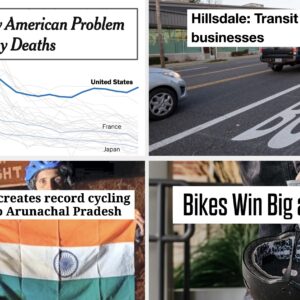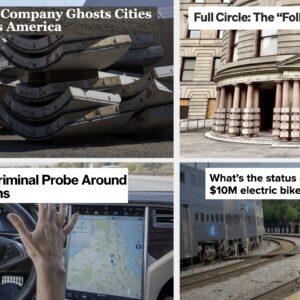Here’s the news that caught our eye this week:
– Yes, the newly minted health bill has a transportation angle.
– Think bike parking corrals are cool? The ribbon was just cut on San Francisco’s first public “parklet” in a former street parking spot.
– An Oregon farmer is arguing that it would be better to mix farms in with the city rather than maintain strict boundaries between urban and rural land use designations.
– Whoops, someone left a piece of Portland in downtown DC during the bike summit and forgot to bring it home.
– What’s wrong with the $4.2 + billion Columbia River Crossing mega project? Nobody’s in charge of making it look good, according to a local architecture blog.
– A proposed ballot measure in California that would reward consistent car insurance coverage, could be a disincentive for trading in your car for other options.
– Crime is down in LA, but bike theft is up. Police and bike messengers are each addressing the problem in their own way.
– Does your bike bell declare your love (or at least a fading red heart) for your bike? Is it painted red, black, and white and did it come from the hardware store in a green and white package, marketed to kids? If so, don’t lick it. The red paint has lead in it, and it’s been recalled.
– Green Portland enjoys only 26% tree canopy cover—leaps and bounds behind such unlikely rivals as San Antonio and Atlanta. The city has vowed to increase street trees.
– What’s the source of biases against people who use various transportation modes? Social psychology has one answer.
– A fascinating inside look at what it takes to get a driving license in China.
– Car exhaust is the cause behind the blackening of Europe’s cathedrals and, less lamented, concrete retaining walls the world over. In South Africa “reverse graffiti” artists are turning this blight into art.
– NYC activists are still hard at work clearing evicting idling cars from bike lanes, dressing as clowns and handing out mock traffic tickets.







Thanks for reading.
BikePortland has served this community with independent community journalism since 2005. We rely on subscriptions from readers like you to survive. Your financial support is vital in keeping this valuable resource alive and well.
Please subscribe today to strengthen and expand our work.
Thanks for pointing out that story from LA about car insurance. Elly.. isn’t that SFBG reporter Steven Jones the same guy who did so much excellent coverage of the Carfree Cities Conference you put on in Portland back in 2008? If so, it’s great to see him continue to pay attention to carfree-related issues…and it shows one of the important, lasting impacts of that conference.
It’s a good story on the farmer out in Damascus that’s trying to think of ways for farming to survive located closely to urban areas. Uses organic methods, doesn’t use chem fertilizer, grows a wide range of crops on a small piece of ground… .
Wants to have a farm supplied restaurant located at the farm. Sounds kind of like what vineyard owners in the Willamette Valley do, which people seem to enjoy very much.
The Damascus farmers idea wouldn’t work for every kind of farming. Various types of large scale industrial farming has some really ugly aspects that make it nearly impossible to live next to.
Regarding tree canopy cover, I’ve moaned about this several times, but the City chopped down MANY trees in my neighborhood to install those stormwater planters. Two steps back to take one step forward in my opinion. I still haven’t heard the reasoning behind it.
I’ll try to find a link but the farm story reminded me of a recent idea that seeks to tear out entire blighted and abandoned neighborhoods in Detroit and replace them with micro-farms.
Nick…fewer trees means fewer piles of leaves raked up and left on the street by by homeowners. Now people riding bikes in your neighborhood no longer will find those piles making an obstacle course.
Too bad an idea couldn’t have been devised to allow leaf piles, which can turn to dirt rather quickly, to provide storm water alleviation. Probably cost less to build and maintain than the storm water ‘bump-its’ the city’s experimenting with.
wsbob #5,
As far as leaf piles in the streets, I think there is a better solution than chopping down trees. That’s sort of like banning dogs because they occasionally poop on the sidewalk.
Leaves do make a very good mulch and I really wonder if the City will be as diligent in maintaining these new stormwater planters as promised when homeowners were first contacted.
Hopefully I’m wrong about the effectiveness and true intention of that project.
“As far as leaf piles in the streets, I think there is a better solution than chopping down trees. …” Nick V
Nick…I meant it facetiously…hope it occurred to you that I might have done so. I’d also like to think there’s a better way to deal with routine chores resulting from the urban landscape and hard scape than the way cities often handle them today.
If neighborhoods had just one lot, community maintained and dedicated to yard and garden debris composting, money spent on city trucks and employees to pick the debris up and haul it miles away could be saved.
Unless they’re prepared to live with the city’s maintenance schedule and quality of work, residents from the neighborhood will likely end up maintaining the plants in the new storm water planters.
wsbob,
Point taken. But if I have to take care of the storm water planter in front of my house, then boy howdy I’m going to put in some trees!
agreed on the farm idea, anything that can bring true food closer to us is better. true food is not the 100acre beef lots that smell like no tomorrow…
however its much more likely that development would snap up all farm land as it is, rather than the farms moving in. So the boundary must be there, just allow agriculture to pass through on either side, with regulation of course
“…however its much more likely that development would snap up all farm land as it is, rather than the farms moving in. So the boundary must be there, just allow agriculture to pass through on either side, with regulation of course ” john in nh
john, not exactly sure what you’re trying to say there. The urban growth boundary definitely seems like a tool that’s essential to protecting open land from the development market.
Fairly large scale vegetable gardening could easily interlace with urban areas. A little research would show this actually was the case in Portland’s recent history. Gresham and the Sandy area still have truck farms, but 5 or 6 decades ago, NE Portland fairly close in had them too.
A number of different factors contributed to their eventual demise. Because of the noise and odors, on much of any scale, I can’t see poultry and livestock farming working out in close proximity to urban populations.
Nick…my crystal ball shows some big new Dutch Elms coming to your neighborhood (by some mysterious quirk of fate). Something smaller, such as a magnolia stellata or a dogwood might work out better though (wink-wink).
Thanks for the link to my CRC blog post. The one correction I’d respectfully make, though, is that the post (and the concern) is about a lot more than “making it look good”, as you put it. It’s about making the CRC well designed. Design isn’t how something looks. It’s how it works.
during ww2 when food was short people had liberty gardens. We have comunity gardens in portland that you have to wait 3 years to get a very small plot. There are tons of empty lots around that will not be built on untill the economy gets better, I wish there was a way we could use those empty lots for food